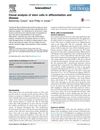 9 citations,
January 2018 in “Stem Cells International”
9 citations,
January 2018 in “Stem Cells International” Deer antler stem cell fluid helps regenerate tissue better than fat-derived stem cell fluid.
 38 citations,
January 2006 in “Journal of Cellular Biochemistry”
38 citations,
January 2006 in “Journal of Cellular Biochemistry” Researchers isolated a new type of stem cell from mouse skin that can renew itself and turn into multiple cell types.
 September 2024 in “Journal of Inflammation Research”
September 2024 in “Journal of Inflammation Research” Type 1 Diabetes prevents hair growth by causing cell death in hair follicles.
 November 2013 in “Elsevier eBooks”
November 2013 in “Elsevier eBooks” Skin and hair renewal is maintained by both fast and slow cycling stem cells, with hair regrowth primarily driven by specific stem cells in the hair follicle bulge. These cells can also help heal wounds and potentially treat hair loss.
 4 citations,
January 2013 in “Advances in Experimental Medicine and Biology”
4 citations,
January 2013 in “Advances in Experimental Medicine and Biology” Certain transcription factors are key in controlling skin stem cell behavior and could impact future treatments for skin repair and hair loss.
 15 citations,
July 2016 in “Biochemical Journal”
15 citations,
July 2016 in “Biochemical Journal” Wnt proteins from certain skin cells are crucial for normal hair growth and renewal.
 August 2023 in “International Journal of Molecular Sciences”
August 2023 in “International Journal of Molecular Sciences” Human skin xenografting could improve our understanding of skin development, renewal, and healing.
 15 citations,
April 2017 in “Cell Stem Cell”
15 citations,
April 2017 in “Cell Stem Cell” Some brain cancer cells avoid immune system detection, and certain treatments could target this to slow their growth; also, certain fat cell precursors help regenerate hair and skin after injury.
13 citations,
July 2020 in “World journal of stem cells” Vitamin D and calcium are important for skin stem cell function and wound healing.
 12 citations,
January 2009 in “Stembook”
12 citations,
January 2009 in “Stembook” Improved understanding of stem cell mechanisms can enhance skin tissue engineering.
 46 citations,
November 2018 in “The journal of investigative dermatology/Journal of investigative dermatology”
46 citations,
November 2018 in “The journal of investigative dermatology/Journal of investigative dermatology” The vitamin D receptor is essential for skin stem cells to grow, move, and become different cell types needed for skin healing.
February 2010 in “Journal of the American Academy of Dermatology” Activating cAMP and ATP improves hair growth and strength.
 11 citations,
July 2016 in “Current Opinion in Cell Biology”
11 citations,
July 2016 in “Current Opinion in Cell Biology” New techniques have enhanced our understanding of how stem cells function and the role of mutations in aging tissues, which may influence future cancer therapies.
 2 citations,
January 2022 in “Stem cell biology and regenerative medicine”
2 citations,
January 2022 in “Stem cell biology and regenerative medicine” The book "Hair Follicle Regeneration" discusses the potential of regenerating human hair follicles or activating dormant ones as a possible cure for baldness, and the promising role of new technologies like 3D printing in this field.
 2 citations,
November 2015 in “Actas Dermo-Sifiliográficas”
2 citations,
November 2015 in “Actas Dermo-Sifiliográficas” Epidermal stem cells show promise for future dermatology treatments due to ongoing advancements.
 January 2012 in “Springer eBooks”
January 2012 in “Springer eBooks” The skin has different types of stem cells that can repair and regenerate tissue.
 12 citations,
August 2016 in “Current opinion in genetics & development”
12 citations,
August 2016 in “Current opinion in genetics & development” Organs like hair follicles can renew themselves in complex ways, adapting to different needs and environments.
 375 citations,
February 2006 in “Journal of Cell Science”
375 citations,
February 2006 in “Journal of Cell Science” The document concludes that the hair cycle is a complex process involving growth, regression, and rest phases, regulated by various molecular signals.
 103 citations,
January 2006 in “Journal of Cell Science”
103 citations,
January 2006 in “Journal of Cell Science” The document concludes that the hair cycle is a complex process involving growth, regression, and rest phases, regulated by various molecular signals.
July 2007 in “Cancer biology & therapy” Removing a key gene in mice leads to premature aging and loss of stem cells.
 1 citations,
October 2013
1 citations,
October 2013 Different ectodermal organs like hair and feathers regenerate differently, with specific stem cells and signals involved in their growth and response to the environment.
 April 2018 in “Journal of Investigative Dermatology”
April 2018 in “Journal of Investigative Dermatology” The protein DDX6 helps keep skin cells renewing properly by controlling the production of certain other proteins and breaking down those that cause cells to mature too quickly.
164 citations,
February 2010 in “Journal of Cell Science” Human dermal stem cells can become functional skin pigment cells.
 70 citations,
March 2008 in “Mechanisms of Ageing and Development”
70 citations,
March 2008 in “Mechanisms of Ageing and Development” Maintaining DNA health in stem cells is key to preventing aging and tissue breakdown.
2 citations,
September 2023 in “International journal of molecular sciences” Special proteins are important for skin balance, healing, and aging, and affect skin stem cells.
 November 2023 in “International Journal of Medical Sciences”
November 2023 in “International Journal of Medical Sciences” New regenerative medicine-based therapies for hair loss look promising but need more clinical validation.
 1 citations,
April 2018 in “Journal of Investigative Dermatology”
1 citations,
April 2018 in “Journal of Investigative Dermatology” Fzd2 is important for skin and hair development through various signaling ways.
 326 citations,
February 2009 in “The American journal of pathology”
326 citations,
February 2009 in “The American journal of pathology” Lgr5 is a marker for active, self-renewing stem cells in the intestine and skin, important for tissue maintenance.
 138 citations,
June 2019 in “Stem Cells and Development”
138 citations,
June 2019 in “Stem Cells and Development” Periodontal ligament stem cells show promise for regrowing tissues but require more research for safe, effective use.
 76 citations,
February 2021 in “International Journal of Molecular Sciences”
76 citations,
February 2021 in “International Journal of Molecular Sciences” Mesenchymal stem cells show potential for skin healing and anti-aging, but more research is needed for safe use, especially regarding stem cells from induced pluripotent sources.

























